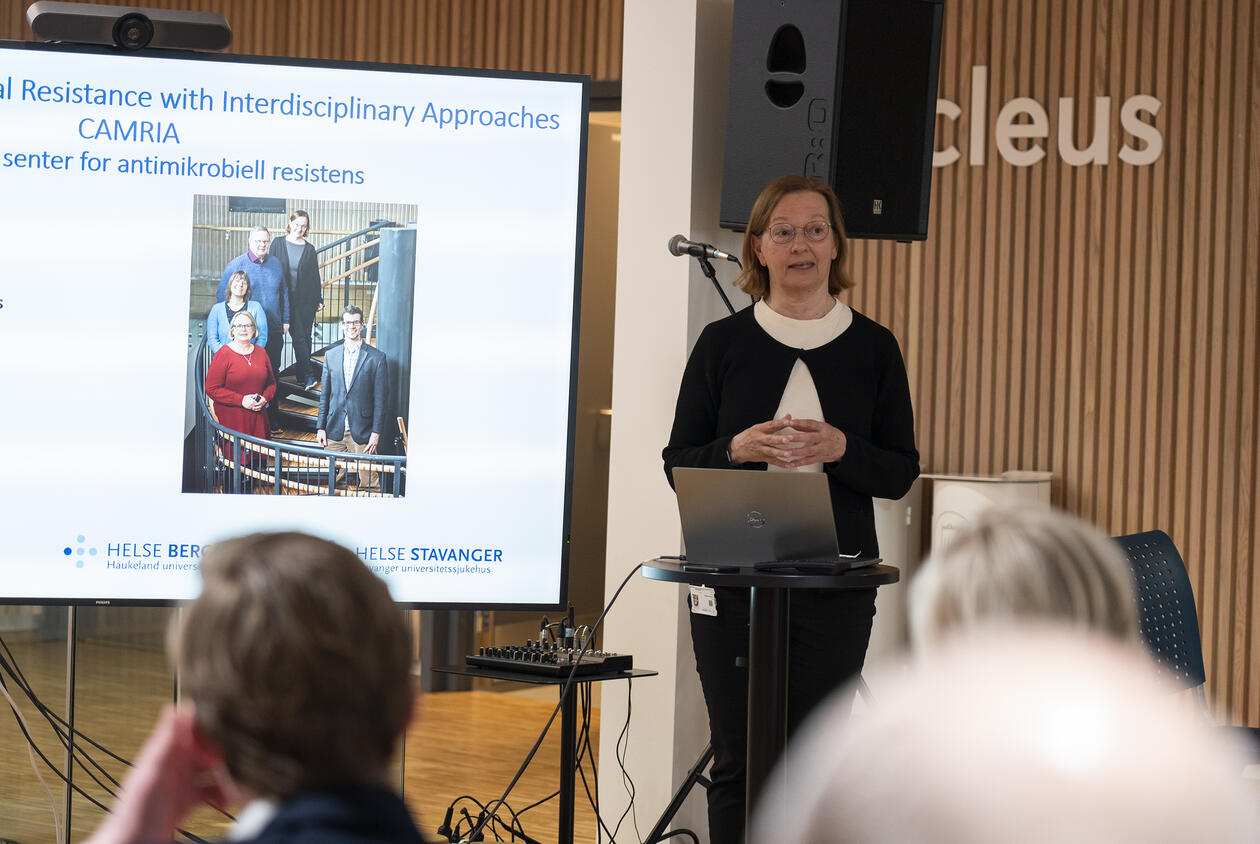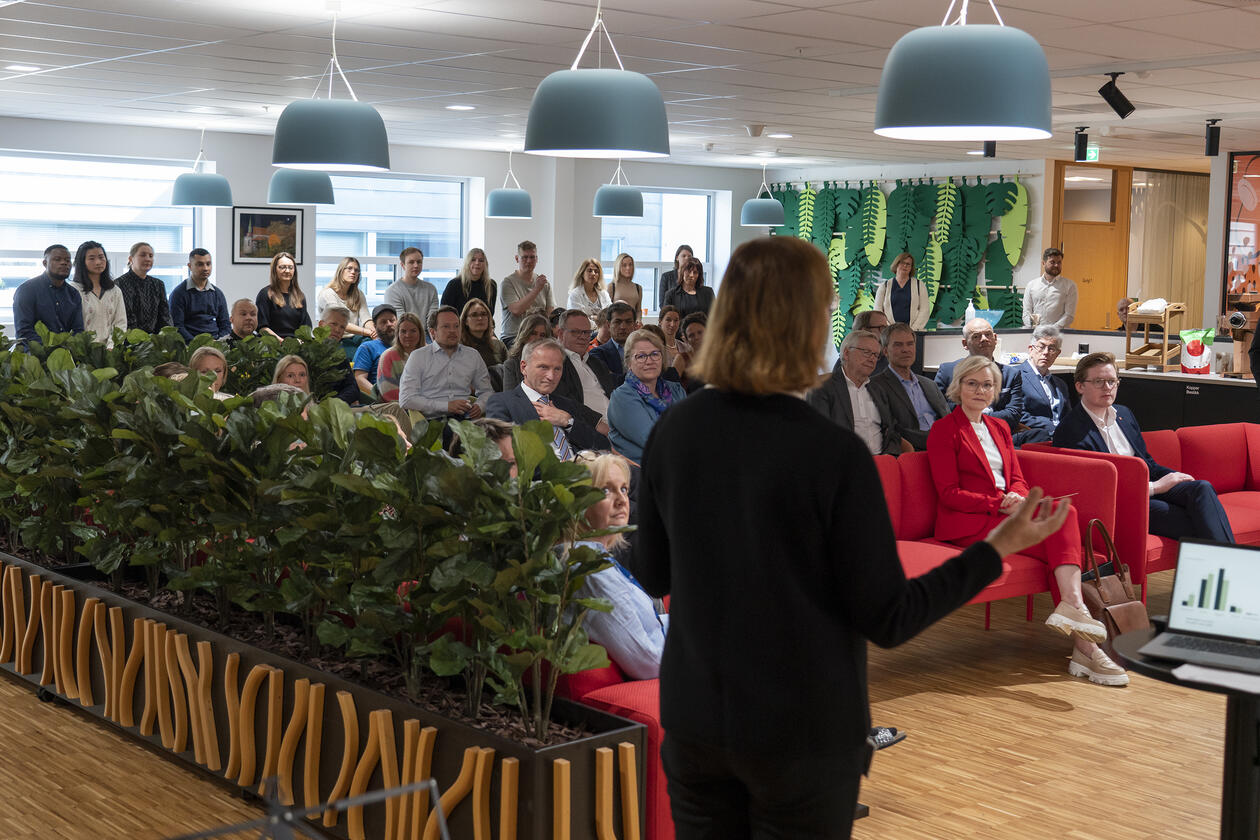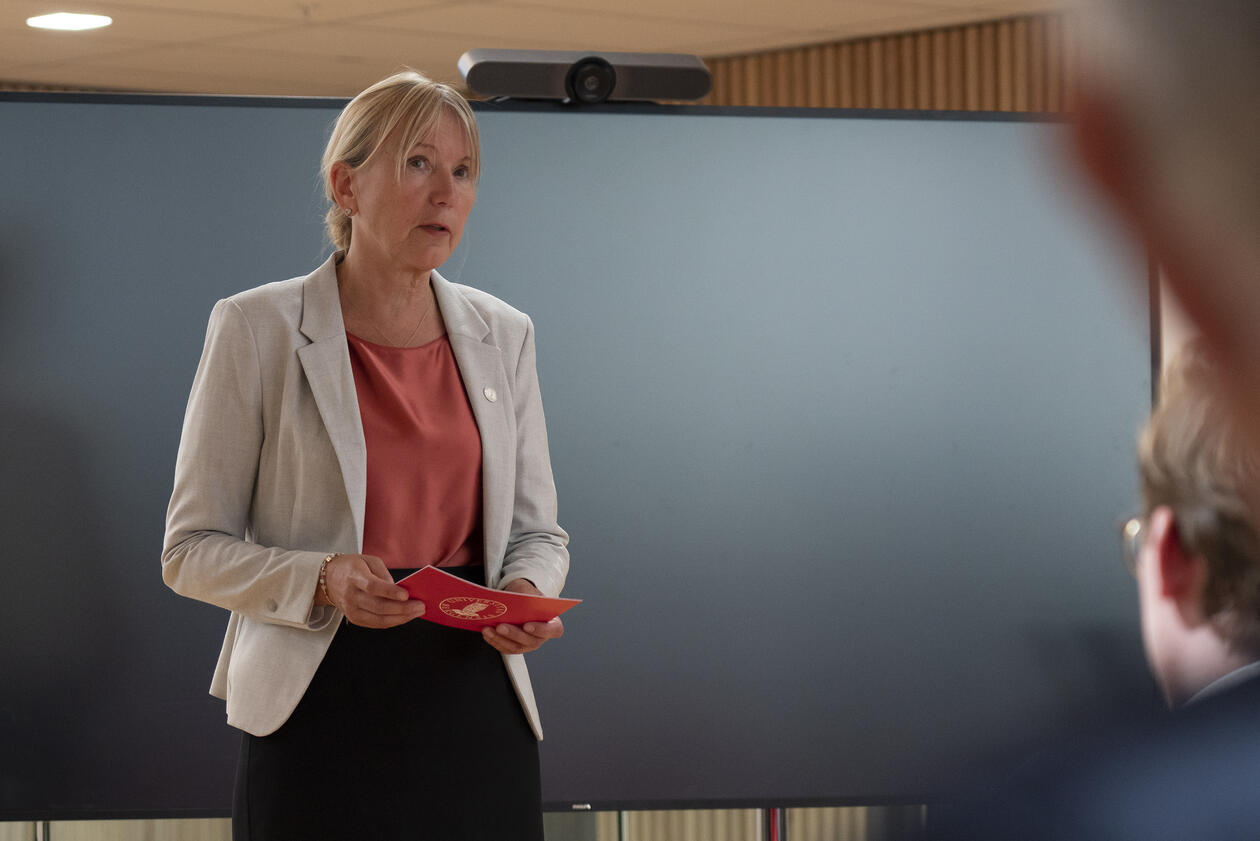Opening of a cross-sectional research center on antibiotic resistance
On Monday the 30th of May the Norwegian minister of health, Ingvild Kjerkol, opened the Western Norway Research Center for Antimicrobial Resistance (CAMRIA). The cooperation between UiB, Haukeland University Hospital, Stavanger University Hospital and the Trond Mohn Foundation will contribute to fight the challenge of antibiotic resistance.

Main content
With the support of the Trond Mohn foundation the University of Bergen, Haukeland University Hospital and Stavanger University Hospital will together investiage how and why resistance develops and spreads, in addition to how health-workers, politicians and the population can reduce excess usage of antibiotics. The center is named CAMRIA which is an acronym for Combatting Antimicrobial Resistance with Interdisciplinary Approach.
– Antibiotics are a common good, and we need to cooperate across borders and diciplines to ensure that the medicine continues to have an effect and represents safety for the treatment we give throughout the whole health-sector, also in Norway, minister of Health in Norway, Ingvild Kjerkol, pointed out.
– I wish CAMRIA good luck on this important and interdisciplinary cooperation on antimicrobial resistance. It will be interesting to follow the development and results when we see medical knowledge, social sciences, informatics and mathematics come together.
Complements the commitment to antibiotic-research
Tree different projects with different approaches to the resistance-challenge are now initiated. This commitment will last until 2026 and are all financed by the Trond Mohn foundation with 25.7 million NOK invested, as well as an equal amount from the host-institutions.
– The national program against antimicrobial resistance is our biggest commitment ever. CAMRIA complements this commitment.
Could become a bigger health-threat than COVID-19
Nina Langeland leads the CAMRIA-center and is professor in infection-medicine at the University of Bergen. She looks forward to present results from the research done at the center.
– Antimicrobial resistance can down the line become an even bigger health-issue than COVID-19, both globally and in Norway. Even in Norway are the resistance-problems increasing, while new antibiotics are almost not developed. Therefore, we need to simultaneously limit unnecessary use of antibiotics as well as reserve new antibiotics for those who really need it. We need to learn more about how resistance toward one medicine affects the development of resistance toward others. We are now looking forward to seeing the results of our research.
Important for the special health services
Haukeland university hospital is the head quarter of the National Competence-service for the use of antibiotics in the special health services (KAS).
– Knowledge transference to limit the use of antibiotics in hospitals is extremely important towards fighting resistance. The research projects of CAMRIA will contribute to this, says Eivind Hansen, Chief Executive Officer at Haukeland University Hospital.
Project #1: Surveillance and tracing of resistant genes through the usage of machine learning
One of the projects is to research the occurrence of resistant antibiotic genes, familiar and new ones, and from which bacteria these genes have its origin. One will look for antimicrobial resistant genes in both humane samples and samples from the surroundings. This information can be used to say something about how resistant genes spreads throughout the surroundings, and whether it is drug or other mechanisms that is the origin to the increase we have seen the past ten years.
A big part of the antibiotic resistant genes that exists in humans has its origin in bacteria from nature and surroundings outside hospitals. These sources of such genes have been studied little, even though we know that the transference of resistant genes from the surroundings are important for the development of multi-resistant bacteria.
– We have access to unique samples which have been gathered over time from general population-studies, among patients, as well as the surroundings. This makes it possible to identify important ARG-reservoirs and mapping geographical differences and developments of antimicrobial resistance over time in the population and our surroundings, says project leader Randi Jacobsen Bertselsen.
Besides researchers from the medical and natural-science professional environments at UiB and the lung-department at Haukeland university hospital, specialists from the biological institute at Aarhus university and Norwegian institute for water-research (NIVA) will be included in the project.
Read more about the project here: MARGIN-project – CAMRIA https://camria.w.uib.no/nb/margin-prosjekt/
Project #2: HyperEvol – predicting the development of antibiotic resistance
In the second projects mathematicians at UiB will together with doctors in Bergen and Stavanger work together in developing methods for predicting the spread of antibiotic resistance. Researchers from the institute of microbiology and infection from the university in Birmingham will also partake.
– To understand the factors that leads to the development and spread of antibiotic resistance we desperately need new approaches to identify development-processes in the body from real datasets. Thus, we can use the large amount of grown clinical data to construct models which is suitable for intervention, says professor Iain Johnston at the Institute of Matematics at UiB.
Read more about the project here: HyperEvol-project – https://camria.w.uib.no/nb/hyperevol-prosjektet/
Project #3: How attitudes and behaviors can be changed
In the third project the topic is to which extent health-workers and most people understand the risk of the effects of antibiotics, to combat life threatening bacteria, being weakened or disappear due to repeated or excessive use. This focus will make up the foundation for better and more efficient communication about these risks. The project is being led by Ingrid Smith who is the senior consultant of internal medicine and infectious diseases at Haukeland university hospital.
– The COVID-19 pandemic is also referred to as a “infodemic”, or an informationpandemic, which has contributed to av change in people’s behavior. In a short period of time one has realized the necessity of measures to reduce the risk of infection like washing your hands, physical distancing, as well as the use of masks. Antibiotic resistance is also a pandemic, but it has not resulted in an equal change in people’s behavior regarding actions toward limiting infections and more correct usage of antibiotics.
Therefore, we need more knowledge about health personnel and the overall populations understanding of this risk, and how it could affect the necessary change in people’s behavior. The goal is to research how antibiotic resistance is presented in the media, and how attitude and action related to the issue is being shaped. When we know more about this, we will have the possibility to design effective strategies and measures to slow down the development of antibiotic resistance, says Smith.
The project is set to be constructed through interviews of health-workers and the general population through the Norwegian citizen panel. The analysis of how antibiotic resistance is portrayed in the media will be led by professor Jens E. Kjeldsen at Department of Information Science and Media Studies at UiB. In addition to researchers from Bergen specialists in infection medicine at Imperial College London will also be involved in the project.
Read more about the project here: CAMRIA Media and antibiotic resistance – CAMRIA https://camria.w.uib.no/nb/camria-media-og-antibiotikaresistens/


